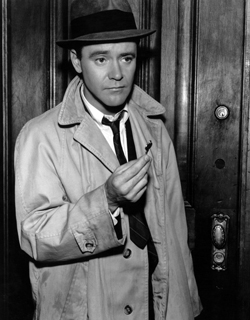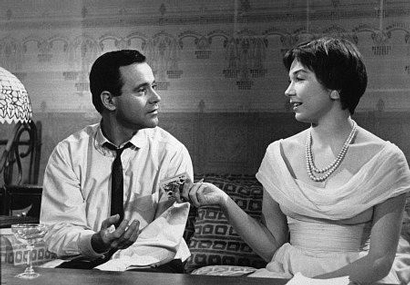
 |
|
|
|
Perhaps Billy Wilder's greatest romantic comedy, The Apartment was alternately savaged and praised by critics upon arrival in 1960. This story of a nice guy in the big business rat race succeeds on as many levels as a Hollywood film can. Wilder retains his nasty streak of cynicism while evoking the sentimental sweetness of his mentor Ernst Lubitsch. The slightly tarnished example of Jack Lemmon's ambitious C.C. Baxter taught a generation of men that aspiring to 'mensch' status might be a good idea, personal outlook-wise. 
Distributed by Fox, MGM's new Blu-ray of The Apartment is the disc that should have come out in 2008, when we instead got a deluxe DVD release. This economical package contains the same extras, menus and cover art of that release. At the time we were concerned that MGM/Fox wouldn't consider its own crown jewels, even with a title as prestigious as this one, which won five Oscars including Best Picture. Billy Wilder and I.A.L Diamond's screenplay is a masterpiece of intricate character plotting. Lowly insurance company clerk C.C. Baxter (Jack Lemmon) has found a unique way to climb the corporate ladder: by lending his apartment key to his philandering superiors. This questionable practice goes smoothly until the big boss Mr. Sheldrake (Fred MacMurray) finds out. Instead of getting canned, Baxter starts loaning his key to Sheldrake on an exclusive basis. The ambitious employee doesn't mind sleeping on park benches or getting a bad reputation with the neighbors. But when he discovers that Sheldrake's promiscuous partner is his own dream girl, elevator operator Fran Kubelick (Shirley MacLaine), Baxter must choose between his heart and his career. (some spoilers ... to be read after you've seen the movie!) Who would dare malign cinema master Billy Wilder, you ask? Lots of critics did. Andrew Sarris said Wilder was 'too cynical to believe his own cynicism." Others mauled him for savaging poor Shirley MacLaine, and condemned her Christmas Eve suicide attempt as the nadir of poor taste. They cited the supposedly cruel treatment dished out to characters played by Jean Arthur, Audrey Hepburn and others, and decided that Wilder was a sour malcontent and possible misogynist. Upscale critics didn't tolerate seeing edgy subjects like suicide in their comedies. But oh, were they wrong ... The Apartment builds an enormous feeling of love and romantic good will. It is also a gem of construction, character development, and thematic clarity. Sure, C.C. Baxter is a morally compromised guy in a corrupt world. His only hope of getting ahead involves dirty business, although I doubt anyone would be shocked by Baxter's gimmick today. C.C.'s only hindsight excuse is that the whole situation snuck up on him. The view of the business world is as cold-blooded as anything in Double Indemnity. Mr. Sheldrake's my-way-or-the-highway mindset is not only accurate, but mild compared to how big companies run today. The same sorts of things happen now, except the added impersonality of modern Human Resources departments would keep any of the duped aspirants from ever finding out exactly how the favored 'buddy boy' got his promotion. Jack Lemmon is perfect in the role as he never was before or since: just experienced enough not to be a naíve dolt, but not yet grating (The Out-of-Towners) or insufferably obvious (April Fools, Save the Tiger). Shirley MacLaine is adorable, whether showing spunk in her elevator job or trying to be discreet about her sad, guilty philandering. And Fred MacMurray plays a heel as only he can. The beloved father of My Three Sons plays the part with hardly an inflection altered - just a switch of morals. This trio has what must be the best supporting cast in film history, led by Ray Walston as the sneering Mr. Dobisch, and Jack Kruschen (so wasted in the same year's The Angry Red Planet) as the warmly and wise Dr. Dreyfuss. Hope Holiday's Christmas Eve bar scene with Lemmon is unforgettable. Joan Shawlee and Joyce Jameson are loveable office bimbos, and Edie Adams took time off from selling cigars in provocative TV ads to play a bitter, double-crossed secretary. 
Wilder and Diamond's world-class screenplay makes them all better than the sum of their talents. Everyone remembers the great bits of business, rendered so accurately in Joe LaShelle's gray-on-gray B&W Panavision: Baxter marching through endless rows of identical desks, a la King Vidor's The Crowd; straining spaghetti through a tennis racket; the forlorn Fran Kubelik breaking down on Christmas Eve. Jokes and gags are orchestrated for maximum efficiency, and emotional touches that might elsewhere become clichés (such as the cracked hand-mirror) hit like slugs to the stomach. In this triangle of deceit, Baxter and Kubelik's vulnerabilities backfire on them with a you-asked-for-it vengeance. When irony strikes, it is never some contrivance, but romantic logic that doesn't care whose heart is broken. The residue of the pain of romance hangs over the film's loser-lovers like a dark cloud. Sheldrake's secretary is a woman changed for the worse through love. Hope Holiday's heartbreak over her jockey jailed by Castro may be a joke, but her loss is sincere. The Apartment sets its romantic couple in the midst of a world where their personal plight is no more 'important' than anyone else's. They're neither perfect, nor without sin. Perhaps the critics were shocked by the idea that the eager young Baxter doesn't believe that goodness will triumph without a little cheating. Would they have preferred him to pray for material success, as seems to happen in so many films influenced by the Production Code? The critics might also then be repulsed by a heroine with low self esteem, one always getting the fuzzy end of the lollypop like Marilyn Monroe in Some Like it Hot. Add this to an overall story that sees infidelity and sordidness unchallenged by a higher morality, and you can understand why conservatives would be dismayed. Baxter and Kubelik are decent enough, but not above petty dishonesties to help them get through the lonely nights -- what's so bad about that? A big section of America has never outgrown the fairy tale mentality, where one good deed always results in an avalanche of reformed hearts and merry good will. With the country's alarming swing toward conservatism, we can expect pundits and spokespeople to begin criticizing the 'low morals' of superior, honest pictures like The Apartment. Wilder was often accused of brutalizing actresses in his movies, even if only a joke in passing. Suicide attempts feature in (Sunset Blvd. and Sabrina). Baxter even talks about killing himself with a .45 automatic. The depths of depression become all too believable when poor Fran shivers with tears, alone in 'some schmuck's apartment' convinced that she's let herself become a whore. A brilliant cinematic moment occurs when Fran 'decides' to kill herself. Many real suicide attempts are described by their makers as happening in the third person. We don't actually see Fran decide to do herself in. Instead, a bottle of pills caught in a shaving mirror POV is just there. Without a cut back to Kubelik, we see a disembodied hand reach in and take the pills, as if the hand belonged to somebody else. It's a perfect example of psychological disassociation expressed in visual terms. It might be our hand too. In her shaky emotional state, Fran is not responsible. 
'Cynical' Wilder manages a gloriously positive ending. Shirley MacLaine's dash through the streets to Adolph Deutsch's unabashedly romantic music has got to be her best moment on screen. But the lovers must still reckon with reality. Sure, they're together and they're in love, but they don't have a job between them. Wilder is famous for nailing a Soviet critic at a European festival, who took a potshot at the U.S.A. by praising The Apartment as anti-American. The critic opined that only in decadent America could such a story take place. Wilder shot back that he agreed entirely, that his story could never happen in Moscow -- because in Moscow there was no such thing as a lendable apartment! Perhaps this awareness of political tensions got Wilder's blood up for his next film, the marvelous Cold War joke-athon, One, Two, Three. MGM-Fox's new Collector's Edition Blu-ray of The Apartment is a marked improvement on the earlier DVD Collector's Edition (2008). The dark and rich transfer may date from the time of that release. Cameraman Joseph LaShelle's deep focus wide shots benefit greatly from the added detail, finally achieving the film's low-contrast gray-on-gray 'European' look. Yet a big screen "is a must" for seeing The Apartment: in the theater we feel as if we are inside the sets, especially Baxter's perfectly-designed apartment, which seems more authentic than if Wilder had filmed in a real New York brownstone. Perhaps this disc would only come unto its own when seen projected eight feet wide in a home theater set-up.
When Billy Wilder passed away in 2002 he was probably inventing acerbic jokes on his deathbed. He's suffered no lack of praise in good DVD extras and excellent feature length biographies over the last few years. This Blu-ray repeats the standard-def extras of the earlier Collector's edition DVD. The two featurettes tell many of the same old stories, but also feature welcome appearances by Walter Mirisch and actors Shirley MacLaine, Hope Holliday and Johnny Seven. A heavy contributor, especially to a sentimental piece on Jack Lemmon, is Lemmon's son Chris.
Producer and author Bruce Block (The Visual Story) contributes a commentary containing plenty of interesting information about the filming. Quoting from the script supervisor's notes, Block points out specific shots that gave Wilder and Co. a hard time, requiring many takes and even re-shoots. Block decries the critical practice of assigning profound meanings to every nuance of direction (and even quotes Wilder to emphasize the point) but then proceeds to over-analyze the film. Wilder's many multi-stage 'gags' -- like the cracked mirror that keeps turning up to reflect the disillusion of his characters -- are repeatedly pointed out, as if we were incapable of perceiving them with our eyes. Some of his points about the nuances of compositions and blocking are questionable as well. Block makes an interesting assertion that the angle on a speaker determines our feelings of warmth toward them: a straight-on shot of a talking person is 'warmer' than an 'impersonal' profile angle, and so forth. Yet his chosen example is a scene between Fran Kubelick and Mr. Sheldrake, where their respective close-ups are almost identical.
The theatrical trailer missing from the Collector's Edition DVD has been reinstated. The main soundtrack is a (presumably doctored) 5.1 DTS-HD Master Audio. Additional soundtracks are provided in Spanish and French mono, but not the original English mono. Subtitles are present in English Spanish and French. The awkward paste-up cover art shows the three leads smiling in a way that is not true to the nature of the movie inside. Perhaps the reason Wilder chose a graphic of keys for the film's original Ad campaign, is that he couldn't think of a workable character image either. I'd vote for the shot of C.C. Baxter drunk on Christmas Eve, sitting at the bar with paper straw wrappers on the brim of his cherished bowler hat. But that image would make the film look too much like The Lost Weekend.
On a scale of Excellent, Good, Fair, and Poor,
The Apartment Blu-ray rates:
Reviews on the Savant main site have additional credits information and are often updated and annotated with reader input and graphics. Also, don't forget the 2011 Savant Wish List. T'was Ever Thus.
Review Staff | About DVD Talk | Newsletter Subscribe | Join DVD Talk Forum |
| ||||||||||||||||||